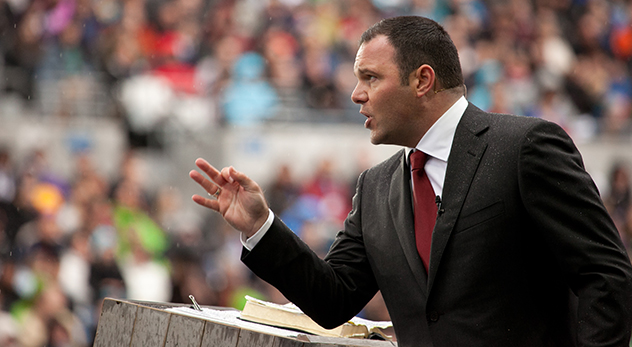
How should Christians respond to the deposed pastor’s return to ministry? – Image courtesy of Flickr creative commons (http://bit.ly/1PJXKmJ)
This past Easter, Jesus wasn’t the only one coming back from the dead. Former mega-church pastor Mark Driscoll also made an attempt at resurrection with the launch of his new church in Scottsdale, Arizona.
For those unaware, Driscoll is the former pastor of Mars Hill Church in Seattle. At its peak, the church had more than a dozen locations and in excess of 12,000 weekly attenders. But in 2014, a string of scandals forced Driscoll to resign. He was accused of plagiarizing content in his books, spending more than $200,000 in ministry money for personal gain, and bullying staff members. While Driscoll had already become known for making misogynistic and homophobic comments, the 2014 controversies were the proverbial straws on the camel’s back. Following his resignation, Mars Hill Church shuttered.
How should Christians respond to the resurrection of Mark Driscoll’s ministry? Some have argued that his sins disqualify him from being a pastor again. Others have suggested that he hasn’t yet paid enough penance and should be forced to work in a non-ministry job for a while longer before returning. And others still say that Christianity’s emphasis on grace and forgiveness requires us to give fallen pastors like Driscoll another chance. Who is right?
READ: “Is Mark Driscoll this generation’s Pat Robertson?”
The Bible doesn’t say much about who is and isn’t qualified to be a pastor, but 1 Timothy 3 sketches the characteristics a church “overseer” should possess. You don’t have to read far before realizing that Driscoll’s past behavior falls outside the list—temperate, self-controlled, respectable, not violent but gentle, not quarrelsome, must have a good reputation with outsiders. If you compare most of these criteria to Driscoll’s long history of comments and actions, the minister would receive a failing grade on his pastoral eligibility test.
So “Bible-believing” Christians must therefore believe that Driscoll’s new church is illegitimate and ill-advisable, right? Not exactly.
First, Paul doesn’t say what should be done if a church leader fails to exhibit these characteristics. Should they be removed or restored? Many interpret the characteristics in 1 Timothy 3 as a standard to which pastors must aspire rather than a rigid legal manual with a one-strike-and-you’re-out policy.
Those who have been a part of a church leadership team can tell you that you’d be hard-pressed to find a pastor who doesn’t arguably fail to meet at least one item on this list. Do you know any pastors who aren’t capable teachers or any who enjoy the finer things in life in a way that seems indulgent? Have you known any pastors with quarrelsome teenage children that fail to obey their every command? Do you know any pastors about whom the nonbelievers in the community gossips or speaks negatively? If you read this passage rigidly, all of those pastors are unfit for ministry.
But just because we don’t read this passage rigidly doesn’t mean we ignore what it intends to teach. Churches should be communities of accountability and encouragement that keep their leaders (and congregants, for that matter) on the road to becoming the type of person that Paul describes. When a leader fails to exhibit self-control, the community should help them mature in that area. When a leader neglects their spouse or children, the community should act to help restore the leader’s family to health. When a leader become too consumed with life’s luxuries, the community should encourage them to remain focused on “treasures in heaven.”
As much as it may disappoint a fundamentalist interpreter, Paul is not compiling a threatening rulebook. He’s mapping out a path whereby a community and its leaders can remain healthy and mature spiritually. He is not setting up a criterion for disqualifying those who aren’t “good enough,” but encouraging leaders to pursue goodness despite their fallenness. If a leader stumbles—and all do if they lead long enough—then Paul’s words point the way back home.
So “grace-loving” Christians must therefore celebrate Driscoll’s new church and his seeming attempt at redemption, right? Not exactly.
Extending grace does not require that we sit idly by while a leader harms others. Instead, grace searches for a way to help the leader grow without sacrificing the health of those they lead. Many people believe that Mark Driscoll’s history of bad behavior has sufficiently demonstrated that his leadership is dangerous to the spiritual health of others. They believe a Pastor Driscoll places others at risk of spiritual abuse. These arguments are difficult to dismiss.
READ: “Why Christians shouldn’t celebrate Mark Driscoll’s demise”
Yet, others say that Driscoll should be given a chance at redemption. They argue that Jesus urged us to forgive each other endlessly, and this forgiveness extends even to (perhaps especially to) fallen leaders. They believe a Pastor Driscoll provides an opportunity to demonstrate to those outside the church that no one can fall farther than the length of God’s arms. These arguments are also difficult to dismiss.
For these reasons, I look on this situation with a measure of both caution and hope. I’m cautious about offering a wholesale endorsement of someone with such a long record of abusive behaviors. But I’m hopeful that even the worst bullies and abusers and narcissists among us are not beyond the reach of grace.
Those of us who are not a part of Driscoll’s new church have no power to determine if it continues, how it will operate, or whether it will succeed. We can only pray that in addition to the resurrection of a fractured ministry, we are also witnessing the rebirth of a fallen minister.





